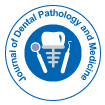எங்கள் குழு ஒவ்வொரு ஆண்டும் அமெரிக்கா, ஐரோப்பா மற்றும் ஆசியா முழுவதும் 1000 அறிவியல் சங்கங்களின் ஆதரவுடன் 3000+ உலகளாவிய மாநாட்டுத் தொடர் நிகழ்வுகளை ஏற்பாடு செய்து 700+ திறந்த அணுகல் இதழ்களை வெளியிடுகிறது, இதில் 50000 க்கும் மேற்பட்ட தலைசிறந்த ஆளுமைகள், புகழ்பெற்ற விஞ்ஞானிகள் ஆசிரியர் குழு உறுப்பினர்களாக உள்ளனர்.
அதிக வாசகர்கள் மற்றும் மேற்கோள்களைப் பெறும் திறந்த அணுகல் இதழ்கள்
700 இதழ்கள் மற்றும் 15,000,000 வாசகர்கள் ஒவ்வொரு பத்திரிகையும் 25,000+ வாசகர்களைப் பெறுகிறது
குறியிடப்பட்டது
- கூகுள் ஸ்காலர்
- ICMJE
பயனுள்ள இணைப்புகள்
அணுகல் இதழ்களைத் திறக்கவும்
இந்தப் பக்கத்தைப் பகிரவும்
சுருக்கம்
Oral Inflammatory Diseases Impact on Atrial Fibrillation: A Comprehensive Review
Patricia Tang
Atrial fibrillation (AF) is a prevalent cardiac arrhythmia associated with a heightened risk of severe cardiovascular complications. While traditional risk factors have been well-established, there is growing evidence to suggest that oral inflammatory diseases may contribute significantly to AF development and progression. This comprehensive review explores the intricate connection between oral inflammatory diseases and AF, highlighting potential mechanisms and clinical implications.
The oral cavity hosts a diverse microbiome and inflammatory conditions such as periodontal disease and gingivitis, among others. These conditions can release pro-inflammatory mediators, bacterial toxins, and elicit immune responses that may affect remote organs and systems, including the cardiovascular system.
Inflammation, a recognized player in cardiovascular diseases, is believed to contribute to AF by promoting atrial inflammation and fibrosis, affecting the myocardium and conduction system, ultimately leading to electrical and structural remodeling. Potential mechanisms encompass the release of inflammatory mediators, endothelial dysfunction, microbiota dysbiosis, and autonomic nervous system activation.
Recognizing the interplay between oral health and AF holds clinical significance. Collaboration between dentists and cardiologists for at-risk patient identification and integrated care plans is crucial. For AF patients, maintaining good oral health may serve as an adjunctive strategy to reduce the risk of AF recurrence and associated complications.
In conclusion, the association between oral inflammatory diseases and AF represents a promising avenue for understanding the multifactorial nature of this cardiac arrhythmia. While further research is required to establish causality and precise mechanisms, the evidence suggests that oral health is not merely confined to dental care but extends to cardiovascular well-being. Acknowledging this intricate relationship between oral and cardiac health paves the way for more holistic patient care and novel approaches to AF prevention and management. Additional studies are needed to validate the clinical utility of addressing oral inflammatory diseases in AF prevention and treatment strategies.
பாடத்தின் அடிப்படையில் இதழ்கள்
- இயற்பியல்
- இரசாயன பொறியியல்
- உணவு மற்றும் ஊட்டச்சத்து
- உயிர் மருத்துவ அறிவியல்
- உயிர்வேதியியல்
- கணிதம்
- கணினி அறிவியல்
- கால்நடை அறிவியல்
- சமூக & அரசியல் அறிவியல்
- சுற்றுச்சூழல் அறிவியல்
- தகவலியல்
- தாவர அறிவியல்
- நர்சிங் & ஹெல்த் கேர்
- நானோ தொழில்நுட்பம்
- நோயெதிர்ப்பு மற்றும் நுண்ணுயிரியல்
- புவியியல் மற்றும் பூமி அறிவியல்
- பொது அறிவியல்
- பொருள் அறிவியல்
- பொறியியல்
- மரபியல் & மூலக்கூறு உயிரியல்
- மருத்துவ அறிவியல்
- மருத்துவ அறிவியல்
- மருந்து அறிவியல்
- வணிக மேலாண்மை
- விவசாயம் மற்றும் மீன் வளர்ப்பு
- வேதியியல்
மருத்துவ & மருத்துவ இதழ்கள்
- அறுவை சிகிச்சை
- இதயவியல்
- இனப்பெருக்க மருத்துவம்
- இம்யூனாலஜி
- இரத்தவியல்
- உடல் சிகிச்சை மற்றும் மறுவாழ்வு
- எலும்பியல்
- கண் மருத்துவம்
- கண் மருத்துவம்
- காஸ்ட்ரோஎன்டாலஜி
- குழந்தை மருத்துவம்
- சிறுநீரகவியல்
- சுகாதாரம்
- தொற்று நோய்கள்
- தோல் மருத்துவம்
- நச்சுயியல்
- நரம்பியல்
- நர்சிங்
- நீரிழிவு மற்றும் உட்சுரப்பியல்
- நுண்ணுயிரியல்
- நுரையீரல் மருத்துவம்
- பல் மருத்துவம்
- மனநல மருத்துவம்
- மயக்கவியல்
- மரபியல்
- மருத்துவ ஆராய்ச்சி
- மருந்து
- மூலக்கூறு உயிரியல்

 English
English  Spanish
Spanish  Chinese
Chinese  Russian
Russian  German
German  French
French  Japanese
Japanese  Portuguese
Portuguese  Hindi
Hindi